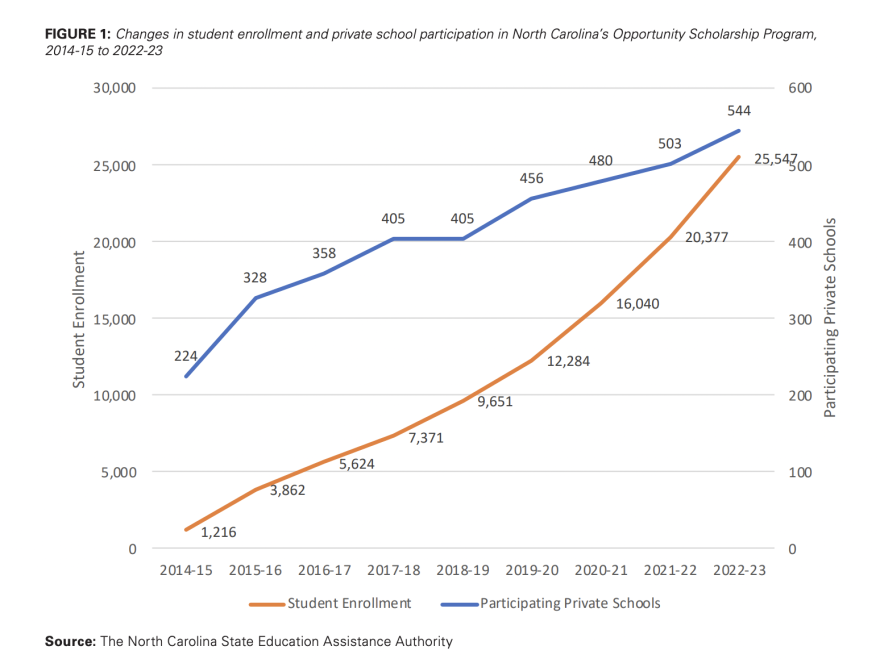A decade after the North Carolina General Assembly approved school vouchers, the Opportunity Scholarship program continues to make news. Republican leaders are pushing for massive expansion of the program in the 2023 session. Critics say the move is devastating to public education. And a report on discrepancies in program data led to the recent acknowledgment that at least one school collected state money for students who weren’t enrolled.
Here’s a look at the program that provides public money to pay private school tuition.
How did Opportunity Scholarships start?
In 2013 the General Assembly approved the program to provide low- and moderate-income families with an alternative to low-performing public schools. Beginning in 2014-15 families eligible for school lunch subsidies for low-income families — about $43,500 for a family of four — could get up to $4,200 a year to pay private-school tuition and fees.
Students who were already enrolled in private schools were not eligible; recipients had to be starting kindergarten or first grade or switching from public schools. Students leaving public schools were eligible regardless of the public school’s performance. The program initially served about 1,200 students.
For future years, increases in the income cap for families and the amount of money available for scholarships were built into the program. The General Assembly continued to approve spending increases even when there wasn’t enough demand to spend all the money allotted.
How does it work now?
For 2023-24, a family of four earning up to $110,000 a year is eligible for a scholarship of up to $6,492. The amount is reduced if tuition is lower than that amount. For families at the upper end of the income scale, the scholarship can be slightly smaller. There are limited exceptions to the requirement that recipients must have attended public schools before getting the money.
At the end of the 2022-23 school year, the program had 25,547 scholarship recipients enrolled in private schools.
The General Assembly’s scheduled allocation for the program is $176.5 million for 2023-24, up from $95 million in the past year.

What changes are proposed?
Matching House and Senate bills would remove the income cap for eligibility, open the scholarships to students already enrolled in private schools and dramatically increase the amount of money available for scholarships starting in 2025-26.
Scholarships would be tied to average per-pupil state spending for public education. Students whose families qualify for lunch subsidies could get 100% of that amount, which the Office of State Budget and Management estimates will be $7,684 in 2025. The amount awarded would drop as family income increases, but even the highest-earning families would be eligible for 45% of the per-pupil allocation, or approximately $3,458. OSMB estimates the average scholarship in 2025-26 would be $5,321.
The OSMB also looked at the impact on public schools if the expansion encourages a shift from public to private schools. Because declining enrollment triggers a cut in state funding, the office projects that total state funding for school districts would drop by about $204 million, or about 2%. Read details, including projected impacts on each district, here.
Do private schools have to take voucher students?
No. Participating schools have to register with the State Education Assistance Authority and submit a criminal background check for the school’s leader.
And qualifying for an Opportunity Scholarship doesn’t guarantee that a student will be admitted to a school, even if it participates in the program. Private schools can set academic, religious and other admission standards. And many schools charge tuition that is significantly higher than the amount provided by the public scholarships.
What kind of schools get voucher money?
Most of the money goes to religious schools, which account for the majority of private schools in North Carolina. During the past school year, 69 schools had at least 100 voucher recipients; 65 were Christian schools, three were Islamic schools and one was secular.
The state’s largest recipient of public scholarships was Grace Christian School in Sanford, which got almost $2.3 million. The largest in Mecklenburg County was Intellicor International Academy, an Islamic school in east Charlotte that got $1.3 million.
Very small schools also participate. An analyst with the North Carolina Justice Center merged data from private school directories and the voucher list; he tallied 77 voucher schools with an enrollment of no more than 25 students in 2022.
What about separation of church and state?
That doesn’t apply to private schools, even if they receive money from the state. A series of court challenges have been filed in the past two decades, as voucher programs boomed across the nation. The U.S. Supreme Court has ruled that religious schools can’t be excluded from voucher programs, even if they teach explicitly religious content. And in 2015 North Carolina’s Supreme Court specifically upheld the use of public money for religious education. Here’s an explainer from WRAL.
North Carolina’s charter schools, which are independent public schools authorized by the state, are not allowed to associate with any religion or religious group. They may lease space in church buildings, but can’t teach religious content. Here’s a Charlotte Observer article about a Charlotte church school phasing out religious content when it became a charter school.
What kind of students receive scholarships?
Last year 61% of Opportunity Scholarship recipients were white and 20% were Black and 11% described themselves as multiracial. No other group accounted for more than 2% of recipients. The state also asks about Hispanic ethnicity separate from race; 15% reported being Hispanic.
Has the program been effective?
The original legislation called for an evaluation of the academic outcomes for scholarship recipients. Researchers from North Carolina State University and Duke Law School each tried to do that and said there was not enough information to draw solid conclusions.
The state requires participating private schools to give standardized exams, but their students don’t take the state exams that are required in public schools. And the private schools don’t have to report results to the public. That makes a precise comparison impossible, both studies reported.
The NC State study, published in 2018 found a "positive, large and statistically significant" edge for scholarship recipients when compared with students from high-poverty neighborhood schools. That was based on private and public schools that agreed to voluntarily administer the Iowa Test of Basic Skills, which yielded a relatively small number of usable exams. The authors also noted that the private schools that chose to participate were disproportionately Catholic schools, which meant results weren’t representative of typical voucher recipients.
The Duke study, published in 2020, reports that initial requirements to provide some measure of academic outcomes have been weakened or ignored, and that “the data do not exist due to the lack of comparable testing between public and private school students.”
Meanwhile, the program has grown. And lawmakers who support the program now say parent demand is the ultimate gauge of accountability.
Who oversees distribution of the money?
The General Assembly created the State Education Assistance Authority, which is governed by nine appointed directors, to handle that task and administer other scholarship programs.
Schools must register with the state’s Department of Non-Public Education before applying to the SEAA to be approved for participation in the Opportunity Scholarship program.
Parents fill out an application for scholarships. Once that’s approved, they can enroll their children in approved schools. SEAA makes payments directly to the schools each semester.
What protection is there against fraud and error?
A June 2023 report from the North Carolina Justice Center identified 62 instances in which the number of vouchers distributed appears to have exceeded the total enrollment of the schools receiving them, as well as schools that received voucher money after they stopped reporting data to the state’s private school directory. In response to WFAE’s queries, the SEAA issued a statement saying discrepancies between enrollment and scholarship recipients may stem from comparing data from two agencies that use different methods.

However, an SEAA official also acknowledged that one of the cases identified in the Justice Center report reflected a real overpayment that had already been detected based on a parent tip. Mitchener University Academy in Selma, a small town about 30 miles southeast of Raleigh, was suspended from the program in 2023 and forced to return more than $37,000 that had been paid in 2022 for students who had withdrawn or not attended. The authority says the school repaid the money but the information was turned over to the State Bureau of Investigation, as required by law.
It remains unclear how many other discrepancies might reflect payments to ineligible students or closed schools. Lawmakers have not commented on whether they’ll add safeguards as they expand spending.







